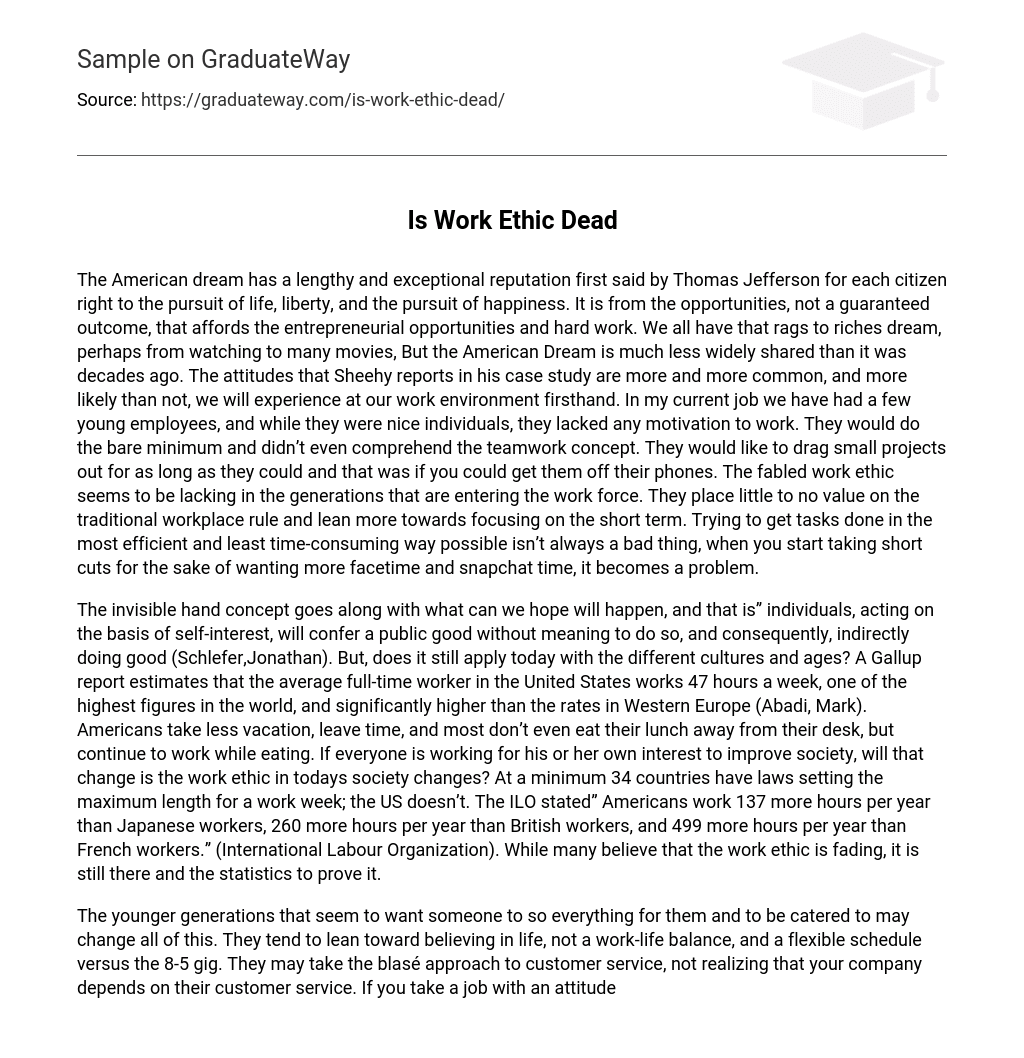The American dream has a lengthy and exceptional reputation first said by Thomas Jefferson for each citizen right to the pursuit of life, liberty, and the pursuit of happiness. It is from the opportunities, not a guaranteed outcome, that affords the entrepreneurial opportunities and hard work. We all have that rags to riches dream, perhaps from watching to many movies, But the American Dream is much less widely shared than it was decades ago. The attitudes that Sheehy reports in his case study are more and more common, and more likely than not, we will experience at our work environment firsthand. In my current job we have had a few young employees, and while they were nice individuals, they lacked any motivation to work. They would do the bare minimum and didn’t even comprehend the teamwork concept. They would like to drag small projects out for as long as they could and that was if you could get them off their phones. The fabled work ethic seems to be lacking in the generations that are entering the work force. They place little to no value on the traditional workplace rule and lean more towards focusing on the short term. Trying to get tasks done in the most efficient and least time-consuming way possible isn’t always a bad thing, when you start taking short cuts for the sake of wanting more facetime and snapchat time, it becomes a problem.
The invisible hand concept goes along with what can we hope will happen, and that is” individuals, acting on the basis of self-interest, will confer a public good without meaning to do so, and consequently, indirectly doing good (Schlefer,Jonathan). But, does it still apply today with the different cultures and ages? A Gallup report estimates that the average full-time worker in the United States works 47 hours a week, one of the highest figures in the world, and significantly higher than the rates in Western Europe (Abadi, Mark). Americans take less vacation, leave time, and most don’t even eat their lunch away from their desk, but continue to work while eating. If everyone is working for his or her own interest to improve society, will that change is the work ethic in todays society changes? At a minimum 34 countries have laws setting the maximum length for a work week; the US doesn’t. The ILO stated” Americans work 137 more hours per year than Japanese workers, 260 more hours per year than British workers, and 499 more hours per year than French workers.” (International Labour Organization). While many believe that the work ethic is fading, it is still there and the statistics to prove it.
The younger generations that seem to want someone to so everything for them and to be catered to may change all of this. They tend to lean toward believing in life, not a work-life balance, and a flexible schedule versus the 8-5 gig. They may take the blasé approach to customer service, not realizing that your company depends on their customer service. If you take a job with an attitude that you don’t care, you aren’t giving the customer service that you were hired to do. When you are providing the best customer service you can, you are able to cultivate a loyal customer base who will tell their peers about you. Good customer service means more understanding customers if something does happen to go wrong. Even if you tend to have a high turn around, I believe that hiring workers who sabotage what your company stands for is not the way to go. Younger workers are more inclined to have a harder time recognizing organizational boundaries and following direction given from a superior. Although it is easy to play the blame, society is letting this behavior continue with no repercussions. The values that were easy to see are getting fewer and fewer. The strong work ethic, positive attitudes, integrity, motivated to continue to learn and taking the responsibility for your own actions may be a thing of the past. I hope that in the future our culture will be able to hang on to some of the values that the older generation prides itself on.





